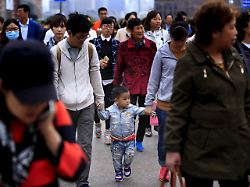Unpleasant prospects
China has growth problems
By Nils Kreimeier
January 21, 2024, 8:37 a.m
Listen to article
This audio version was artificially generated. More info | Send feedback
China’s economy is weakening, and at the same time fewer and fewer people are being born there. This does not bode well for urgently needed growth.
There is an old sentence about China that has been repeated over and over again in recent years: The huge empire could become the first country whose population grows old before it gets rich, it has often been said, warningly or with a slight shudder. An important part of the global economy and industry, including Germany, depends on an agile, growing China.
But now two developments that are very problematic for China and its trading partners actually appear to be intersecting. Gross domestic product (GDP) growth for 2023 was announced on Wednesday. At 5.2 percent, the value was slightly above the Chinese government’s official target and also significantly higher than in 2022, when the national economy only grew by three percent. But what superficially looked like a success is actually an alarm signal: On the one hand, the economy grew more strongly because the starting point was so low in the previous year – a year with drastic Corona restrictions and closed ports. And even the 5.2 percent growth is one of the lowest rates in recent decades. Since 1990, only the Covid years have actually led to such slumps.
In addition, and this is where the other axis of the old China prophecy comes into play, the country is also in trouble demographically. The once most populous country in the world experienced a negative record for newborns in 2023, with only 6.39 births per 1,000 inhabitants registered, after 6.77 in the previous year. Together with rising death rates, this means that China is shrinking, for the second year in a row. The country lost over two million net people last year, and with 1.41 billion inhabitants, China is falling further behind the new leader India.
The reasons lie, on the one hand, in the one-child policy, which was intended to keep population growth under control for decades and is now backfiring. However, the regulation was relaxed eight years ago, which is why the current falling birth rates can only be explained to a limited extent. Instead, poor health care and the high cost of living in the cities may have contributed to fewer and fewer Chinese people deciding to start a family. And then there is the pandemic: initially praised in many countries for the government’s rigid intervention, over time the control grew into a dystopian excess. When all the floodgates suddenly opened, any real strategy for dealing with Covid-19 was essentially done.
Real estate market is in trouble
The coincidence of the two major developments – economic slowdown and population decline – has far-reaching consequences in all areas of the Chinese economy. Consumer spending is falling, as is the number of available workers. Above all, it hits the real estate market, one of the most important pillars of the Chinese economy with a GDP share of 30 percent. According to official statistics, house and apartment sales fell by 8.5 percent in 2023, and investments in the sector fell by 9.6 percent. The number of vacant Chinese residential projects continues to rise.
This in turn affects the Chinese people’s wealth, which is largely based on real estate ownership. The effect is a downward spiral in economic growth that is likely to continue this year. The International Monetary Fund (IMF) only expects GDP to increase by 4.2 percent in 2024 – significantly too little for a growth market.
If this multitude of crises leads to real deflation, this could have fatal consequences for the interest of investors, consumers and general trust in the Chinese market. For the world’s economists, however, this would actually be a new case study: a large industrial nation that ages before it has had enough money to build a functioning social system has never existed before.
